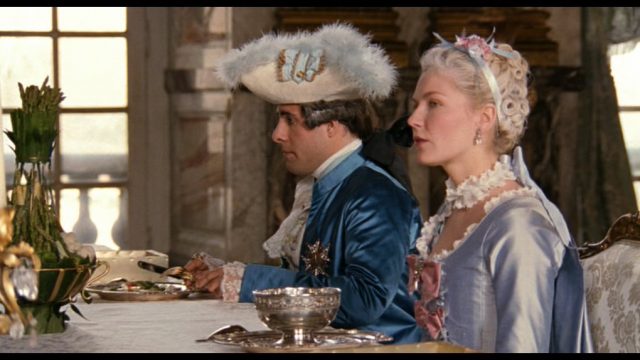I recently rewatched Marie Antoinette and what caught my attention this time around is the architecture of Marie and Louis’s marriage. Coppola constructs it carefully. Like any structure built to last, it’s built slowly, brick by brick, and we see that process in detail. Movie romances are often whirlwinds–couples leap into attraction, into sex, into misunderstandings, into grief. It takes Marie and Louis years to even work out what exactly is supposed to happen in the bedroom, and even then, there’s no great outpouring of passion for each other: the political significance is the heirs and the personal significance is the lessened stress. They become easier with each other because they no longer have the consummation, or lack thereof, as a looming threat.
Coppola follows the couple through their early stages, from scrutinized pictures and idle speculation with friends to excruciatingly awkward nights in bed, and we see transitions. Louis continues backing away from really touching his bride, but his abrupt good nights gain a little more prologue as he tries to solve Marie’s “chill” by getting her a blanket; Marie reaches the point of honestly telling him that their lack of children is hurting her reputation and he actually approximates something like smoothness in reassuring her. Actual warmth gradually enters their relationship and we see real fondness between them. He’s something of a stick-in-the-mud, but she still takes him with her when she sneaks off the masked ball; he smiles at her desire to stay up all night gambling and asks her not to lose their entire fortune; he comes in person to fetch her home; he applauds her performance, borrowing her own exuberant appreciation. She has an affair, but that is no real betrayal of what’s between them, which has never had much to do with sex. They are each other’s closest companion, and when she refuses to leave him at the end of the film, and he does not try to persuade her to go, it is, in a quiet way, deeply affecting.
The exact trajectory of the Marie/Louis marriage–and especially its beginnings–would be hard to duplicate in any contemporary-set film. But the constancy of their relationship–its ebb and flow, interruptions, companionship, and devotion–is something that can still be charted and attended to. It’s undramatic, but it works well for quiet movies, and excellently as a backdrop to a more dramatic plot. (Like, say, the French Revolution.) And indeed some of the best portrayals of marriage in cinema I can think of are marriages that are kept in the background, acting as the house in which the story takes place.
Some of my favorites would include Fredric March and Myrna Loy in The Best Years of Our Lives, Nick and Nora Charles, Adam Driver and Golshifteh Farahani in Paterson, Charlotte Rampling and Tom Courtenay in 45 Years (where the house is on the verge of crumbling, a flaw in its foundation having been revealed), Elizabeth Taylor and Richard Burton in Who’s Afraid of Virginia Woolf? (where the house should probably be bombed to rubble), Donald Sutherland and Julie Christie in Don’t Look Now, and, heartbreakingly, Beulah Bondi and Victor Moore in Make Way for Tomorrow. All these movies are attentive to the gestures and moments that sustain marriages and to the pressures that can threaten them, and they all make their relationships affecting beyond the arc of courtship.
What are some of your favorite movie marriages, good or bad?

